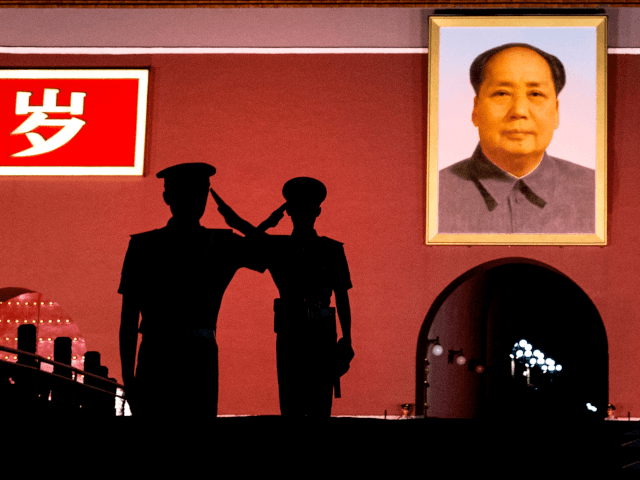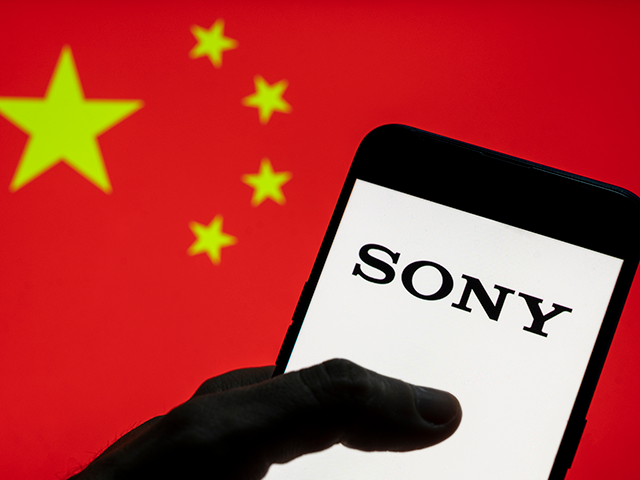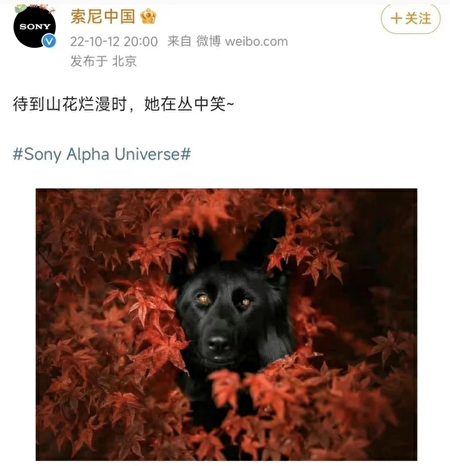Electronics and entertainment giant Sony was banned from Weibo, China’s heavily-censored version of Twitter, last week for supposedly violating unspecified laws.
Most observers believe the true reason for the ban was Sony, a Japanese corporation, misusing a quote from one of Chinese Communist Party founder Mao Zedong’s poems and “defaming” a Communist party hero of the Korean War.
China’s state-run Global Times explained the alleged insult in detail Sunday in an editorial that suggested Sony deserved to be kicked off Chinese social media without delay:
On October 12, 2022, Sony China published a post quoting a line from a poem from late Chairman Mao Zedong: “When the flowers were in full bloom, she smiled among the bushes.” Along with the quote, the post attached a picture of the head of a black dog surrounded by red flowers. The verse was originally meant to extol the plum blossom in the snow that symbolizes the tenacious spirit of the members of the Communist Party of China in facing hardship.
In early January 2023, some scrupulous Chinese netizens suspected that the picture of a dog hiding in the flowers was an insult against Chinese hero Qiu Shaoyun. Qiu gave his life during the War to Resist US Aggression and Aid Korea (1950-53) when enemy troops dropped incendiary explosives on his position while his unit was waiting in ambush.
To ensure the success of the mission and not give away his unit’s position, the brave soldier allowed himself to be burned to death rather than try to save himself by jumping into a nearby stream. Netizens pointed out that the post was made on the 70th anniversary of Qiu’s death. And the flower and dog combination shows hints of a well-known oil painting depicting the moments before Qiu’s death in the fire.
#Japanese electronics giant #Sony, banned from posting on #China’s Sina Weibo, should be held accountable for defaming Chinese #Korean War hero Qiu Shaoyun. https://t.co/rZxkEE8Nbc
— Global Times (@globaltimesnews) January 9, 2023
The “War to Resist U.S. Aggression and Aid Korea” is the Chinese Communist Party’s tortured name for the Korean War, the conflict in which China unleashed the nuclear horror of the psychotic North Korean regime upon the human race. The modern Chinese government is fond of making excruciatingly long and deeply dishonest propaganda films to promote its view of the conflict.

A woman walks past a movie promotion poster of “The Battle of Lake Changjin” at a mall in Beijing on October 11, 2021. (NOEL CELIS/AFP via Getty Images)
The rather elaborate insult described by the Global Times sounds much less plausible than someone at Sony China attempting to flatter the Chinese customer base by publishing a bit of Mao poetry, and they liked the painting of the black dog surrounded by flowers. It seems a bit odd that a company heavily invested in selling goods to Chinese consumers would put so much effort into designing an oblique way to insult and infuriate them.
The Epoch Times on Saturday noted the insulting interpretation of the Sony post was heavily promoted by the Jiangsu Communist Youth League, one of many loud voices among China’s “50 Cent Army” of online hotheads, who are perpetually looking for ways to be offended.

Chinese paramilitary police officers salute each other as they stand guard below a portrait of the late leader Mao Zedong in Tiananmen Square on June 4, 2014, in Beijing, China. (Kevin Frayer/Getty Images)
The Epoch Times recalled a few previous occasions on which the Communist Youth types proclaimed their “glass heart” had been shattered by something Sony China posted online.
Several of those freak-outs were cited by the Global Times as reasons to give Sony China the ban it has been begging for. Some of the alleged prior insults were even more of a stretch than the dog-in-flowers painting.
For example, the Global Times castigated Sony for merely daring to launch a new product on July 7, 2021, when everyone knows July 7 is the hallowed anniversary of an important incident that occurred as Japan was occupying China in 1937.
“One case may be a coincidence, but how about three in a row? It is obvious that posting these contents on sensitive days are no accident at all but a clear sign of Sony China’s ill intention to defame China,” the Global Times raged, without considering the possibility that “three in a row” might also be a sign that someone is making a sustained effort to be perpetually offended.
As to which law Sony China might have violated, the Global Times noted that China has a law that says “no organization or individual may insult, slander or infringe upon the names, portraits, reputation or honor of heroes and martyrs in public places.” Sony was fined a million yuan (about $150,000 dollars) for allegedly violating this law with the above-mentioned July 7 product launch.
A dissident Chinese blogger named Sun Jie and a Hong Kong-based herbal tea chain that supported his satirical writing were slapped with a token fine and ordered to apologize to Qiu Shaoyun’s family in 2016 because Sun wrote a post that allegedly “had a negative influence, harmed public sentiment, undermined public interests, and caused Qiu’s family psychological damage.”
Sun’s 2013 blog post dismissed the Qiu legend as “Communist propaganda” and mockingly compared his fiery death to barbecuing a steak. The tea company, JDB, made a sarcastic reference to the since-deleted blog post in 2015. Both were ordered to apologize by a district court on the grounds that Qiu Shaoyun’s “sacrifice and patriotic spirit” are a Chinese national treasure.


COMMENTS
Please let us know if you're having issues with commenting.